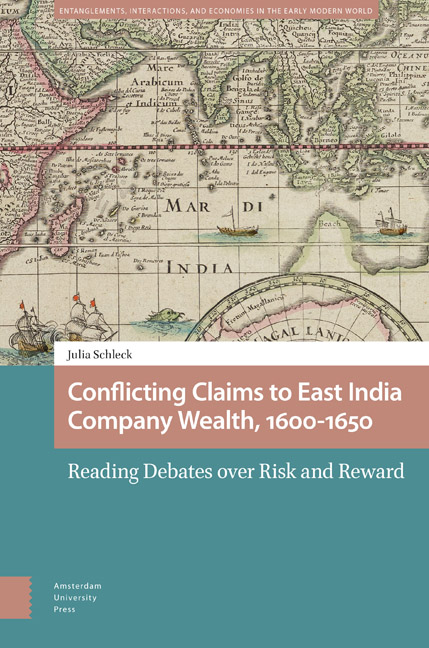Book contents
Introduction
Published online by Cambridge University Press: 16 April 2024
Summary
Abstract
Conflicting Claims to East India Company Wealth examines the debates surrounding England's earliest global trading ventures, centered on moral critiques of wealth and the unequal distribution of risks and rewards in the lengthy voyages required by the East Indies trade. It traces the forging of discursive rationales justifying the new capitalist inequalities in London, and the material and bureaucratic tactics Company servants abroad used to resist their masters’ will, controlling information and promoting ignorance when it served their financial and sexual purposes. This book interrogates the forces that shaped England's earliest forays into capitalist imperialism by tracing the battles over corporate control of men's finances, marriages, and bare survival at the dawn of its global trade.
Keywords: East India Company, early modern merchants, early modern sailors, history from below, English political economy, mercantilism
“bookes [are] as false as may bee and noe trust [is] to bee giuen to them.”The East India Company's servants working abroad knew how easy it was to manipulate books, presenting partial truths, inaccurate numbers, and blank silences when it served their purposes. When a reply to a given letter or set of records was a year or more away, it was a relatively simple matter to “forget” to write something, slip into an undecipherable personal shorthand, or just neglect to send an account to the masters at all. “Beware,” one factor living in the East Indies counseled another, “of sending home imperfect accounts; better it were in my opinion to send none.” Such deception and neglect were part of a set of practices that developed among the mariners, factors, and other servants of the East India Company abroad, in which they implicitly rejected the nascent capitalist insistence that those with only labor to sell bear nearly all the risk while those with capital reap nearly all the rewards. Their persistent but muted rebellion against their masters participated in a larger debate spurred by the spectacular profits produced by the new long-distance trade: who should benefit from this wealth, who should bear the costs associated with fetching it from halfway across the globe, and who should have control over these decisions?
- Type
- Chapter
- Information
- Conflicting Claims to East India Company Wealth, 1600-1650Reading Debates over Risk and Reward, pp. 9 - 46Publisher: Amsterdam University PressPrint publication year: 2024

